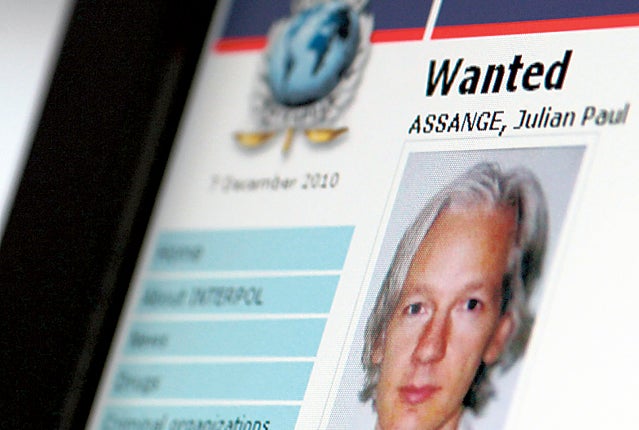US may pass new law to prosecute Assange

Anger at Julian Assange continues to consume much of Washington this weekend, and a first formal hearing on Capitol Hill over options for prosecuting him could come as early as next week. Yet a claim made by one of the WikiLeaks founder's lawyers, that the US was preparing to file charges against him "imminently", was dismissed by an official at the Justice Department.
That Washington would like to take legal action against him and as quickly as possible can hardly be in doubt. But building a case solid enough to allow Eric Holder, the US Attorney General, to seek Assange's extradition from Britain, if that is where he still is at the time, or – possibly more problematically – from Sweden, may not be easy. The most obvious first stop might be the 1917 Espionage Act. But when the US government tried to use it to punish The New York Times for publishing the Pentagon Papers in the 1970s, it failed.
It is for that reason that some US politicians are introducing draft legislation to expand existing US laws to make it easier for Mr Holder to do his job. The so-called Securing Human Intelligence and Enforcing Lawful Dissemination (Shield) Bill was thus introduced by Congressman Peter King, a Republican from New York who will become chairman of the House Intelligence Committee when the new House of Representatives with a Republican majority convenes in January. The Bill would make it illegal to publish the names of military or intelligence community informants.
It essentially mirrors a similar piece of draft legislation introduced a few days earlier in the Senate by the trio of Joe Lieberman of Connecticut (an independent who votes normally with the Democrats) with Scott Brown and Susan Collins, both New England Republicans.
While hearings on those bills may not begin until the new year, officials said they expect the House Judiciary Committee to kick off the process with an initial hearing this Thursday on how the Espionage Act might be updated to give prosecutors more room for manoeuvre in the digital age.
While it was widely assumed that Amazon, MasterCard and PayPal were acting in response to direct appeals from the US government when they severed ties with WikiLeaks, Mr Holder insisted late on Friday that no such arm-twisting had taken place. "We have not pressured anybody to do anything," he said at a news conference in San Francisco when asked if the government had tried to influence companies such as Amazon.
The political pressure on the Obama administration to take action is immense – pressure being applied, in part, by Capitol Hill. "WikiLeaks presents a clear and present danger to the national security of the United States, and Julian Assange, an enemy of the US, should be prosecuted under the Espionage Act," Mr King said as he unveiled his draft Shield Bill. "This legislation will give the Attorney General additional tools to do just that."
The difficulty of using the 93-year-old Espionage Act against Assange may be that what he and WikiLeaks have done are protected under America's freedom of expression traditions. This could force the Justice Department to explore other laws, for example on computing, to prosecute him – or alternatively to wait for Congress, as Mr King suggests, to forge new laws for this purpose.
Join our commenting forum
Join thought-provoking conversations, follow other Independent readers and see their replies
0Comments